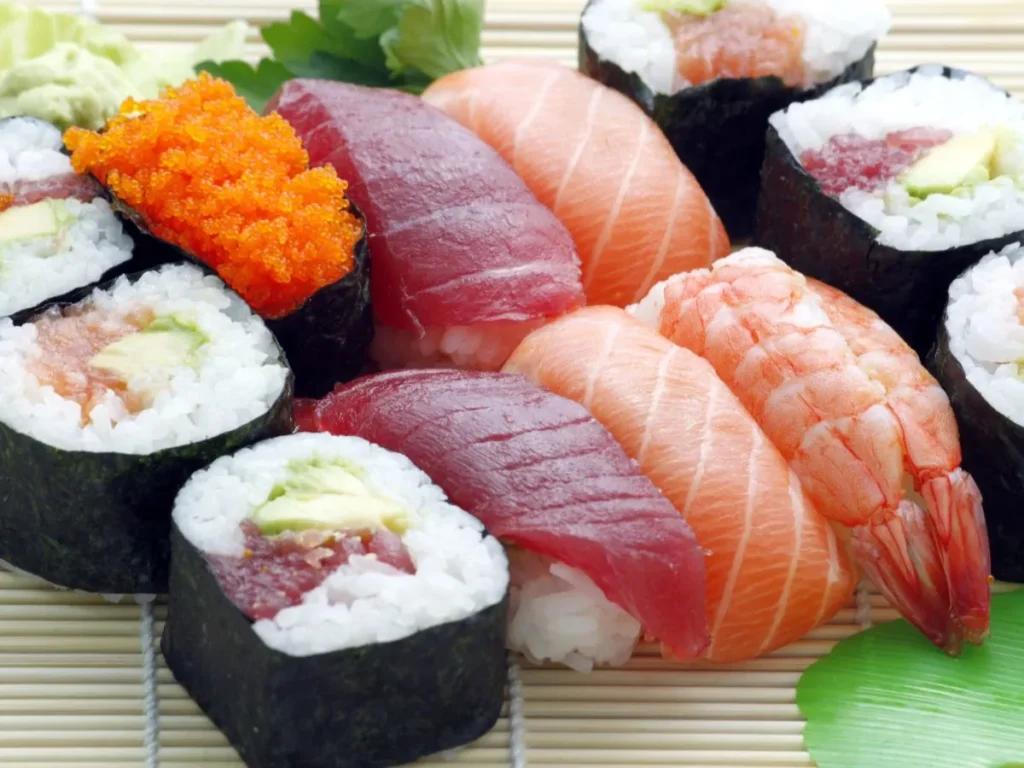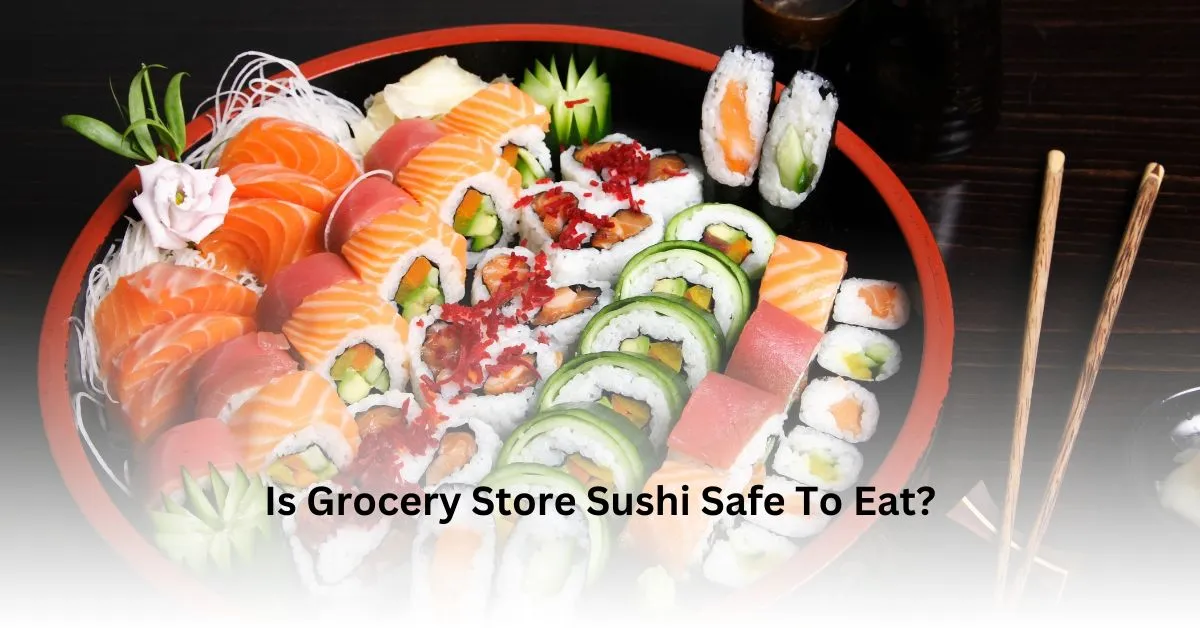Sushi, originating from Japan, has experienced a remarkable surge in popularity across Western countries in recent decades. Once considered a niche delicacy, sushi has now become a mainstream culinary phenomenon, captivating the taste buds of millions with its unique flavors, elegant presentation, and purported health benefits. From sleek sushi bars to the convenience of pre-packaged rolls lining the shelves of grocery stores, sushi has firmly established its place in the Western culinary landscape, reflecting a growing appreciation for diverse and exotic cuisines. However, a pressing question often arises among consumers: Is grocery store sushi safe to eat?
Understanding Grocery Store Sushi
Grocery store sushi refers to pre-made sushi products that are sold in food marts and convenience stores. These sushi options encompass a variety of traditional and contemporary sushi dishes, including sushi rolls, nigiri, sashimi, and sushi platters. Typically found in the refrigerated sections of grocery stores, these pre-packaged sushi items are prepared off-site and packaged for convenient consumption. They often come with accompanying soy sauce, wasabi, and pickled ginger packets, providing consumers with a complete sushi experience without the need for additional preparation.
Growth of sushi availability in grocery stores
The availability of sushi in grocery stores has experienced significant growth in recent years, mirroring the increasing popularity of sushi among Western consumers. Once considered a niche delicacy primarily found in specialized sushi restaurants, sushi has now become a mainstream food option readily available in supermarkets across the globe. This expansion can be attributed to several factors.
Firstly, the globalization of food supply chains has made it easier for supermarkets to source fresh seafood and other sushi ingredients from various regions worldwide. Improved transportation and distribution networks ensure that supermarkets can offer a wide selection of sushi options to cater to diverse consumer preferences.

Secondly, consumer demand for convenient and ready-to-eat meal solutions has fueled the proliferation of sushi in grocery stores. With busy lifestyles becoming the norm, many individuals seek quick and hassle-free dining options that do not compromise on taste or quality. Grocery store sushi meets this demand by providing a convenient alternative to dining out or preparing sushi at home from scratch.
Additionally, the growing popularity of sushi as a perceived healthy food choice has contributed to its widespread availability in grocery stores. Sushi is often lauded for its use of fresh ingredients, lean proteins, and minimal processing, making it an appealing option for health-conscious consumers looking to make nutritious food choices.
Why people opt for grocery store sushi?
One of the primary reasons people opt for grocery store sushi is the convenience it offers. Unlike traditional sushi dining experiences that may require reservations and wait times, grocery store sushi can be purchased on the go during routine grocery shopping trips. This convenience factor is especially appealing to people with busy schedules who may not have the time or inclination to dine out or prepare meals at home.
Moreover, grocery store sushi eliminates the need for consumers to have specialized sushi-making skills or equipment. With pre-made sushi options readily available, consumers can enjoy their favorite sushi dishes without the hassle of rolling sushi rice and slicing fish. This accessibility democratizes the sushi experience, making it accessible to a wider audience beyond sushi aficionados and culinary enthusiasts.
Is grocery store sushi safe to eat?
Amidst the convenience and popularity of grocery store sushi, a pressing question arises: Is grocery store sushi safe to eat? While the allure of grabbing a sushi roll during a grocery run is undeniable, concerns about the safety and quality of these pre-packaged options linger in the minds of consumers. The transition to addressing this main question is pivotal, as it prompts a deeper exploration of the factors influencing the safety of grocery store sushi.
Is grocery store sushi safe? This question underscores the importance of examining various aspects, including the sourcing of ingredients, the standards of preparation, and the adherence to food safety regulations. As consumers navigate the sushi aisle in supermarkets, it becomes essential to realize the potential risks and considerations associated with consuming grocery store sushi. In the following sections, we will delve into these factors to provide a deep understanding of the safety implications of grocery store sushi consumption.

Assessing Safety Factors
Quality of Ingredients
- The freshness of seafood:
One of the primary safety considerations when evaluating grocery store sushi is the freshness of the seafood used in its preparation. Fresh seafood is essential for ensuring the safety and quality of sushi, as well as for preventing the risk of foodborne illnesses. When assessing the freshness of seafood in grocery store sushi, consumers should look for signs of freshness, such as clear eyes, shiny skin, and a mild sea aroma. Additionally, the seafood should be properly stored at the right temperature to keep it fresh and prevent bacterial growth.
- Quality of rice and other ingredients:
In addition to fresh seafood, the quality of rice and other ingredients used in grocery store sushi also plays a crucial role in its safety. The rice should be cooked correctly and seasoned with vinegar to prevent the growth of harmful bacteria. Other ingredients, such as vegetables and condiments, should be fresh and of high quality to ensure the overall safety and taste of the sushi.
Food safety regulations and standards
- FDA guidelines for sushi preparation and handling:
The Food and Drug Administration (FDA) has established guidelines and regulations for the preparation and handling of sushi to ensure its safety for consumption. These guidelines include recommendations for sourcing seafood from reputable suppliers, maintaining proper hygiene practices during preparation, and adhering to temperature control requirements to prevent bacterial contamination. Grocery stores that sell sushi are expected to comply with these FDA guidelines to ensure the safety and quality of their sushi products.

- Compliance of grocery stores with food safety standards:
In addition to FDA guidelines, grocery stores are also subject to various food safety standards and regulations set by local health authorities. These standards may include requirements for maintaining clean and sanitary food preparation areas, conducting regular inspections of sushi preparation facilities, and training staff in proper food handling practices. Consumers can inquire about the food safety practices of their local grocery stores to ensure that they are compliant with these standards.
Sushi preparation and handling practices
- Hygiene practices in grocery store sushi preparation:
Hygiene practices play a critical role in ensuring the safety of grocery store sushi. Sushi chefs and staff should follow strict hygiene protocols, such as frequent hand washing, wearing gloves, and using clean utensils and equipment to prevent cross-contamination. Additionally, sushi preparation areas should be kept clean and sanitized to minimize the risk of bacterial contamination.
- Temperature control and storage conditions:
Proper temperature control and storage conditions are essential for preventing the growth of harmful bacteria in sushi. Grocery stores should store sushi products at the appropriate temperature to maintain their freshness and safety. This includes storing raw seafood at refrigerated temperatures and keeping cooked sushi products at safe holding temperatures to prevent bacterial growth. Consumers can check the temperature of sushi display cases and inquire about the storage practices of their local grocery stores to ensure that sushi products are being handled safely.

Risks associated with raw fish consumption
- Potential for foodborne illnesses:
One of the primary risks related to consuming raw fish in sushi is the potential for foodborne illnesses. Raw fish may consist of harmful bacteria and parasites that can lead to food poisoning and other health issues if not properly handled and prepared. Consumers should be conscious of the risks associated with raw fish consumption and take precautions to minimize their exposure to these pathogens.
- Measures to mitigate risks:
To mitigate the risks associated with raw fish consumption, consumers can take several precautions when purchasing and consuming grocery store sushi. This includes choosing sushi products from reputable stores with a track record of food safety compliance, inspecting sushi products for signs of freshness and proper handling, and consuming sushi immediately after purchase to minimize the risk of bacterial contamination. Additionally, consumers can opt for cooked sushi options or sushi made with cooked seafood to reduce the risk of foodborne illnesses connected with raw fish consumption.
Debunking Myths and Misconceptions
Is raw fish safe to eat?
One of the most common concerns surrounding grocery store sushi is the safety of consuming raw fish. Many individuals worry about the potential risks of foodborne illnesses associated with eating raw fish, particularly when it comes from a grocery store rather than a specialized sushi restaurant. The fear of contracting illnesses such as salmonella or parasitic infections can deter people from indulging in raw fish sushi options available at supermarkets.

Can sushi from grocery stores be trusted?
Another prevalent concern among consumers is the trustworthiness of sushi purchased from grocery stores. Some individuals question the quality and safety of pre-packaged sushi options, wondering if they are held to the same standards as sushi served in restaurants. Doubts may arise regarding the sourcing of ingredients, the hygiene practices during preparation, and the overall integrity of grocery store sushi products.
Addressing misconceptions with facts and evidence
Understanding sushi-grade fish and its safety
Contrary to popular belief, raw fish used in sushi is not inherently unsafe to eat. Sushi-grade fish, also known as sashimi-grade fish, undergoes a rigorous process to ensure its safety for raw consumption. This process typically involves freezing the fish at ultra-low temperatures to kill any parasites that may be present. Additionally, sushi-grade fish is sourced from reputable suppliers who adhere to strict quality and safety standards.
Furthermore, sushi chefs are trained to recognize and handle sushi-grade fish properly, minimizing the risk of contamination during preparation. When purchasing grocery store sushi, consumers can look for indications that the fish used is sushi-grade, such as labels or descriptions provided by the manufacturer or store.
Dispelling myths about sushi freshness and quality
Despite misconceptions, grocery store sushi can be fresh and of high quality when sourced from reputable suppliers and prepared with care. Sushi prepared in supermarkets is often made fresh daily or multiple times throughout the day to ensure its freshness and taste. Additionally, grocery stores may partner with sushi chefs or suppliers who specialize in sushi preparation, further enhancing the quality of their sushi offerings.
Moreover, grocery store sushi undergoes stringent quality control measures to maintain its freshness and safety. Sushi products are typically stored and displayed in refrigerated cases to prevent bacterial growth and maintain optimal freshness. Consumers can assess the freshness of grocery store sushi by examining its appearance, smell, and texture, as well as checking for expiration dates and other indicators of quality.

Tips for Safe Consumption
Choosing reputable stores and brands
Factors to consider when choosing a grocery store for sushi
When it comes to purchasing sushi from grocery stores, selecting a reputable store is paramount for ensuring safety. Factors to consider that include the cleanliness of the store’s sushi preparation area, the freshness of ingredients, and the overall reputation of the store for food safety. Look for grocery stores that prioritize cleanliness and transparency in their sushi preparation process, as well as those that source their ingredients from reputable suppliers.
Recognizing trustworthy sushi brands
In addition to choosing a reputable store, it’s essential to recognize trustworthy sushi brands that prioritize quality and safety. Look for sushi brands that have a strong reputation for sourcing high-quality ingredients, adhering to food safety regulations, and maintaining strict hygiene practices during preparation. Reading online feedback and seeking recommendations from friends or family members can help identify reputable sushi brands known for their commitment to safety and high quality.

Inspection and observation
Checking for signs of freshness and proper handling
Before purchasing grocery store sushi, take a moment to inspect the sushi products for signs of freshness and proper handling. Look for sushi that appears fresh and well-presented, with vibrant colors and appetizing appearances. Check for any signs of mishandling, such as torn packaging or improper storage conditions. Additionally, observe the cleanliness of the sushi display case and surrounding areas to ensure that proper hygiene practices are being followed.
Asking questions and seeking clarification from store staff
Don’t hesitate to ask questions and seek clarification from store staff regarding the safety and quality of the sushi products. Inquire about the sourcing of ingredients, the frequency of sushi preparation, and the store’s adherence to food safety standards. Be proactive in voicing any concerns or preferences you may have, and don’t hesitate to request information or assistance from knowledgeable store staff members.
Proper storage and handling at home
Guidelines for storing sushi safely
Once you’ve purchased grocery store sushi, it’s crucial to shop it properly to maintain its freshness and safety. Store sushi in the refrigerator as soon as possible after purchase, ideally in a sealed container or wrapped tightly in plastic wrap to prevent exposure to air and moisture. Consuming sushi within one to two days of purchase is recommended to minimize the risk of bacterial growth and ensure optimal freshness.

Best practices for consuming sushi to minimize risks
When consuming grocery store sushi at home, it’s important to follow best practices to minimize the risk of foodborne illnesses. Wash your hands thoroughly before handling sushi, and use clean utensils and plates to serve and eat the sushi. Avoid leaving sushi at room temperature for an extended period and consume it promptly after removing it from the refrigerator. Additionally, discard any leftover sushi that has been left out at room temperature for more than two hours to prevent the risk of bacterial contamination.
Also Read: Importance of Table Manners Because It Matters
Conclusion
In conclusion, while grocery store sushi can be a convenient and enjoyable option for sushi lovers, it is important to prioritize safety and quality to ensure a satisfying dining experience. By following the tips and guidelines outlined in this article, consumers can make informed decisions about their sushi choices and minimize the risks associated with grocery store sushi consumption. While concerns about the safety of raw fish and the trustworthiness of sushi from supermarkets may linger, taking proactive measures such as selecting reputable stores, inspecting sushi products, and practicing safe storage and handling can help mitigate these concerns.
We encourage readers to remain vigilant and discerning when purchasing and consuming grocery store sushi. By staying informed about safety considerations, understanding the risks and benefits associated with grocery store sushi, and following safe consumption practices, consumers can enjoy sushi confidently and responsibly. Remember to trust your instincts, ask questions, and prioritize your health and well-being when making sushi-related decisions. With careful consideration and informed decision-making, you can indulge in grocery store sushi safely and enjoyably.
